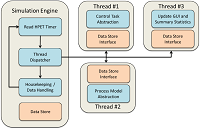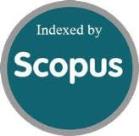On the Jitter Sensitivity of an Adaptive Digital Controller: A Computational Simulation Study
Keywords:
adaptive control, digital control, digital signal processing, timing jitterAbstract
In many real-time control applications, the ability to accurately track a reference trajectory with stable, pre-specified closed-loop dynamics is highly desirable. For fixed gain control systems, the detrimental impact of jitter on performance has been relatively well studied. However, research that quantifies the possible impact of jitter on the performance and relative stability of adaptive control schemes is comparatively much rarer. With technology advances now making real-time adaptive control a viable option for high-speed applications, this situation requires further investigation. In this paper, the jitter sensitivity of a digital parameter adaptive tracking control system is studied using precise software-in-the-loop computational simulations. The results obtained indicated that the adaptive controller was significantly susceptible to jitter. In particular, key metrics such as the phase margin, gain margin, settling time, overshoot and root mean square parameter and tracking errors were all significantly impacted following the introduction of 5% jitter in the controller. The obtained data are thought to be the first detailed results of this kind and present useful insights into the practical complexities when innovating adaptive real-time tracking control systems and indicate that specialized controller implementations that minimize jitter should be employed and that further analysis is warranted.
References
K. J. Astrom and B. Wittenmark, Adaptive control, 2nd ed. Addison Wesley, 1995.
J. S. Kumar and D. Sankar, “Implementation of adaptive embedded controller for a temperature process,” Advances in Technology Innovation, vol. 4, no. 2, pp. 94-104, March 2019.
I. Nascu, I. Nascu, and G. Vlad, “Predictive adaptive control of an activated sludge wastewater treatment process,” Advances in Technology Innovation, vol. 1, no. 2, pp. 38-40, October 2016.
M. Short and K. Burn, “A generic controller architecture for intelligent robotic systems,” Robotics and Computer Integrated Manufacturing, vol. 27, no. 2, pp. 292-305, 2012.
R. C. Dorf and R. H. Bishop, Modern control systems, 10th ed. Englewood Cliffs, NJ: Prentice-Hall, 2004.
K. J. Astrom and B. Wittenmark, Computer-control systems: theory and design, 3rd ed. Prentice Hall, ISBN 0-13-314899-8, 1997.
Y. Wu, G. Buttazzo, E. Bini, and A. Cervin, “Parameter selection for real-time controllers in resource-constrained systems,” IEEE Transactions on Industrial Informatics, vol. 6, no. 4, pp. 610-620, November 2010.
J. Nilsson, B. Bernhardson, and B. Wittenmark, “Stochastic analysis and control of real-time systems with random time delays,” Automatica, vol. 34, no. 1, pp. 57-64, January 1998.
G. Buttazzo and A. Cervin, “Comparative assessment and evaluation of jitter control methods,” Proceedings of the 15th International Conference on Real-Time Networks and Systems (RTNS), Nancy, France, 2007.
A. Cervin, “Improved scheduling of control tasks,” Proceedings of the 11th Euromicro Conference on Real-Time Systems (ECRTS), York, England, June 1999, pp. 4-10.
G. Buttazzo, “Research trends in real-time computing for embedded systems,” ACM SIGBED Review, vol. 3, no. 3, pp. 1-10, July 2006.
A. A. Fröhlich, G. Gracioli, and J. F. Santos, “Periodic timers revisited: the real-time embedded system perspective,” Computers and Electrical Engineering, vol. 37, pp. 365-375, May 2011.
E. Boje, “Approximate models for continuous-time linear systems with sampling jitter,” Automatica, vol. 41, no. 12, pp. 2091-2098, December 2005.
F. Abugchem, M. Short, and D. Xu, “An experimental HIL study on the jitter sensitivity of an adaptive control system,” Proceedings of the 18th IEEE International Conference on Emerging Technologies & Factory Automation (ETFA), Italy, 2013.
F. Abugchem, “A kernel level solution for jitter control in resource-constrained real-time control applications,” Ph.D. dissertation, Teesside University, UK, August 2016.
M. J. Pont, Patterns for time-triggered embedded systems: building reliable applications with 8051 family of microcontrollers, Addison Wesley, 2001.
A. J. Jerri, “The Shannon sampling theorem: its various extensions and applications: a tutorial review,” Proceedings of the IEEE, November 1977, vol. 65, no. 11, pp. 1565-1596.
F. Cottet and L. David, “A solution to the time jitter removal in deadline based scheduling of real-time applications,” Proceedings of the 5th IEEE Real-Time Technology and Applications Symposium (RTAS), Vancouver, Canada, June 1999, pp. 33-38.
D. J. McKinnon, B. Karanayil, and C. Grantham, “Investigation of the effects of DSP timer jitter on the measurement of a PWM controlled inverter output voltage and current,” Proceedings of the 4th IEEE International Power Electronics and Motion Control Conference, Xi’an, China, August 2004.
F. Eisenbrand and T. Rothvoss, “Static-priority real-time scheduling: response time computation is NP-hard,” Proceedings of the IEEE Real-Time Systems Symposium (RTSS), Barcelona, Spain, November 2008, pp. 397-406.
M. Short, F. Abugchem, and U. Abrar, “Dependable control for distributed wireless control systems,” Electronics, vol. 4, no. 4, pp. 857-878, November 2015.
L. Ljung and T. Soderstrom, Theory and practice of recursive identification, MIT Press, 1983.
L. Ljung, System identification: theory for the user, 2nd ed. Prentice Hall, 1987.
C. P. Neuman and C.S. Baradello, “Digital transfer functions for microcomputer control,” IEEE Transactions on Systems, Man and Cybernetics, vol. 9, no. 12, pp. 856-860, 1984.
M. Short, “Development Guidelines for Dependable Real-Time Embedded Systems,” Proceedings of the IEEE/ACS International Conference on Computer Systems and Applications (AICCSA), Doha, Qatar, April 2008, pp. 1032 – 1039.
M. Short, “A simplified approach to multivariable model predictive control,” International Journal of Engineering and Technology Innovation, vol. 5, no. 1, pp. 19-32, January 2015.

Published
How to Cite
Issue
Section
License
Copyright Notice
Submission of a manuscript implies: that the work described has not been published before that it is not under consideration for publication elsewhere; that if and when the manuscript is accepted for publication. Authors can retain copyright in their articles with no restrictions. Also, author can post the final, peer-reviewed manuscript version (postprint) to any repository or website.

Since Jan. 01, 2019, IJETI will publish new articles with Creative Commons Attribution Non-Commercial License, under Creative Commons Attribution Non-Commercial 4.0 International (CC BY-NC 4.0) License.
The Creative Commons Attribution Non-Commercial (CC-BY-NC) License permits use, distribution and reproduction in any medium, provided the original work is properly cited and is not used for commercial purposes.



.jpg)


